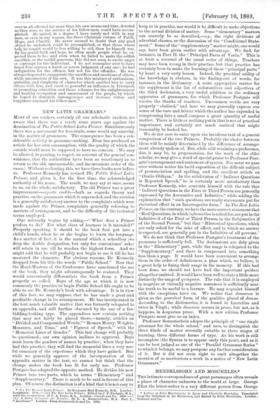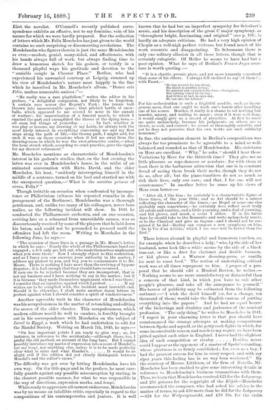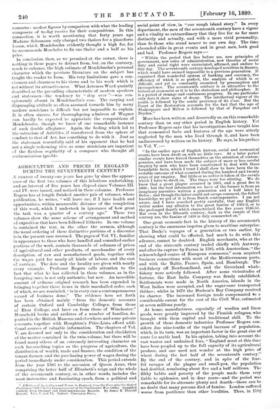MENDELSSOHN AND MOSCHELES.* THE intimate correspondence of great personages often
reveals a phase of character unknown to the world at large. George Eliot the letter-writer is a very different person from George • Letters of Felix Mendelssohn to /plias and Charlotte Moscheles. Translated from the Originals in his Possession, and Edited by Felix Moscheles. London TrUbnor and Co.
Eliot the novelist. O'Connell's recently published corre- spondence exhibits an effusive, not to say feminine, vein of his nature for which we were hardly prepared. But the collection of letters which Mr. Felix Moscheles has just given to the world contains no such surprising or disconcerting revelations. The Mendelssohn who figures therein is just the same Mendelssohn as ever,—modest, genial, many-sided, and affectionate, with his hands always full of work, but always finding time to draw a humorous sketch for his godson, or testify in a thousand playful ways his gratitude and devotion to the " amiable couple in Chester Place." Berlioz, who had experienced his unwearied courtesy at Leipzig, summed up his view of Mendelssohn's nature most happily in the line which he inscribed in Mr. Moscheles's album, "Done errs Felix, multos numerabis amic,os :"—
" He really was a rare playfellow," writes the editor in his preface, " a delightful companion, not likely to be forgotten. A certain race across the Regent's Park ; the tennis ball thrown into immeasurable space ; that pitched battle of snow- balls, which appeared to me second to none in the annals of warfare : his improvisation of a funeral march, to which I enacted the part and exemplified the throes of the dying hero,—
all seem but things of yesterday In fact, whether it was play or lessons, my drawing or my Latin, he always took the most lively interest in everything concerning me and my first steps along the path of life,—the thorny path, I might add, for such it was on those occasions when it led me away from the drawing-room in which he was the ever-attractive centre,—when the hour struck which, according to cruel practice, gave the signal for my discreet retirement."
Mr. Moscheles mentions as characteristic of Mendelssohn's interest in his godson's studies, that, on the last evening the latter was ever in Mendelssohn's house, in the midst of an animated conversation with Rietz, David, and the elder
Moscheles, his host, " suddenly interrupting himself in the middle of a sentence, turned on his heel and startled me with the unexpected question,—' What is the aoristus prinzus of stain, Felix ?' "
Though irritable on occasion when confronted by incompe- tence or Philistinism (witness his repeated remarks in dis- paragement of the Berlinese), Mendelssohn was a thorough gentleman, and, unlike too many of his colleagues, never bore malice, as the following incident will show. In 184-5 he
conducted the Philharmonic orchestra, and on one occasion, arriving late at a rehearsal from unavoidable causes, was so discourteously received by some of the players that he laid down his baton, and could not be persuaded to proceed until the offenders had left the room. Writing to Moscheles in the following June, he says :—
"The occasion of these lines is a passage in Mr. Moore's letter, in which he says : Nearly the whole of the Philharmonic band are engaged ; a few only are left out, who made themselves unpleasant when you were there.' Now I strongly object to this restriction, and as I fancy you can exercise your authority in the matter, I address my protest to you, and beg you to communicate it to Mr. Moore. There is nothing I hate more than the reviving of bygone disputes ; it is bad enough that they should have occurred. . . . . . If men are to be rejected because they are incompetent, that is not my business and I have nothing to say in the matter ; but if it is because they made themselves unpleasant when I was there,'
I consider that an injustice, against which I protest If my wishes are to be complied with, the incident must herewith end. Should it be otherwise, I shall write another dozen letters in protest against what I should consider a spirit of vindictiveness."
Another agreeable trait in the character of Mendelssohn was his scrupulousness in the matter of retouching and editing the scores of the older classics. This scrupulousness, which modern editors would do well to emulate, is forcibly brought out in his correspondence with Moscheles on the subject of Israel in Egypt, a work which he had undertaken to edit for the Handel Society. Writing on March 7th, 1845, he says :—
"On less important points I am ready to give way; as, for instance, in reference to the accidentals,—although there, too, I prefer the old method, on account of the long bars. But I cannot possibly introduce my marks of expression into a score of Handel's, nor my tempi, nor anything else, unless it is to be made perfectly clear what is mine and what Handel's It would be no slight evil if the edition did not clearly distinguish between Handel's and the editor's views."
The difficulty was got over by letting Mendelssohn have his own way. On the title-page and in the preface, he most care- fully guards against any possible misconception by stating, in the clearest possible manner, for what he was responsible in the way of directions, expression marks, and tempi.
While ready to appreciate all earnest endeavour, Mendelssohn was by no means an infallible critic, especially in regard to the compositions of his contemporaries and juniors. It is well known that he had but an imperfect sympathy for Schubert's music, and his description of the great C major symphony, as "throughout bright, fascinating, and original" (see p. 191), is hardly an adequate criticism. He had a very high opinion of Chopin as a well-nigh perfect virtuoso, but found much of his
work eccentric and disappointing. To Schumann there is only one solitary allusion in all these letters, though that is certainly eulogistic. Of Heller he seems to have had but a, poor opinion. What he says of Berlioz's Francs Juges over- ture is worth quoting :— "It is a chaotic, prosaic piece, and yet more humanly conceived than some of his others. I always felt inclined to say [of them ?1, with Faust,-
' He ran around, ho ran about, His thirst in puddles laving ; He gnawed and scratched the house throughout, But nothing cared his raving ;
And driven at last, in open day,
He ran into the kitchen.'
For his orchestration is such a frightful muddle, such an incon- gruous mess, that one ought to wash one's hands after handling one of his scores. Besides, it really is a shame to set nothing but murder, misery, and wailing to music ; even if it were well done, it would simply give us a record of atrocities. At first he made me quite melancholy, because his judgments on others are so clever, so cool, and correct ; he seems so thoroughly sensible, and yet he does not perceive that his own works are such rubbishy nonsense."
In fine, the antinomian element in Berlioz's compositions was always far too prominent to be agreeable to a mind so well- balanced and rounded as that of Mendelssohn. His strictures on Herz are excellent. " Why," he asks, " should I hear those Variations by Herz for the thirtieth time ? They give me as little pleasure as rope-dancers or acrobats : for with them at least there is the barbarous attraction that one is in constant dread of seeing them break their necks, though they do not do so, after all ; but the piano-tumblers do not as much as risk their lives, only our ears ; and that, I for one will not countenance." In another letter he sums up his views of
Herz even better :—
" After all, I like him : he certainly is a characteristic figure of these times, of the year 1834 ; and as Art should be a mirror reflecting the character of the times,—as Hegel or seine one else probably says somewhere,—he certainly does reflect most truly all salons and vanities, and a little yearning, and a deal of yawning, and kid gloves, and musk, a scent I abhor. If in his latter days he should take to the Romantic and write melancholy music, or to the Classical and give us fugues—and I should not be sur- prised if he did—Berlioz can compose a new symphony on him,
De la Vie d'un Artiste,' which I am sure will be better than the first."
These letters abound in playful and humorous touches, as, for example, when he describes a lady, " who, by the side of her husband, must look like a white mouse by the side of a black tom-cat, or like a. duet for clarionet and double bassoon, or kid gloves and a Warsaw dressing-gown, or vanilla ice next to roast beef." The notion of undertaking critical work was at all times repugnant to him. .1 propos of a pro- posal that he should edit a Musical Review, he writes :- " Nothing seems to me more unsatisfactory or distasteful than a concern of that kind, in which you have to suit other people's pleasure, and take all the annoyance to yourself." His horror of publicity may be estimated from the following outburst :—" I wish the devil himself (or, for a change, ten thousand of them) would take the English custom of putting everything into the papers." And he had an equal horro-
of the bickerings and rivalries and jealousies of the musical profession. " The only thing," he writes to Moscheles in 1841, " I regret in your charming letter is that you should have countenanced the strange attempts at making comparisons between Spohr and myself, or the petty cock-fights in which, for some inconceivable reason and much to my regret, we have been
pitted against each other in England. I never had the slightest
idea of such competition or rivalry Besides, never could I appear as the opponent of a master of Spohr's standing, whose greatness is so firmly established ; for, even as a boy, I had the greatest esteem for him in every respect, and with my riper years this feeling has in no way been weakened." By the courtesy of Messrs. Littleton, of the firm of Novelle, Mr. Moscheles has been enabled to give some interesting details in reference to Mendelssohn's business transactions with them. Thus, we learn that Mendelssohn received £25 for the Lobgesang, and 250 guineas for the copyright of the Elijah—Moscheles recommended the composer, who had asked his advice in the matter of terms, to ask £50 more than he did for the Lobgesang —£24 for the Walpurgisnacht, and £10 10s. for the violin
concerto : modest figures by comparison with what the leading composers of to-day receive for their compositions. In this connection, it is worth mentioning that forty years ago Madame Schumann only charged two thalers for a pianoforte lesson, which Mendelssohn evidently thought a high fee, for he recommends Moacheles to fix one thaler and a half as his price.
In conclusion, then, as we premised at the outset, there is nothing in these pages to detract from, but, on the contrary, much to enhance, the high estimate of Mendelssohn's personal character which the previous literature on the subject has taught the reader to form. His very limitations gave a con- ciseness and clearness to his views and to his work which is not without its attractiveness. What Artemus Ward quaintly described as the prevailing characteristic of modern speakers and statesmen—the tendency to " slop over "—was con- spicuously absent iu Mendelssohn's case. The carping and disparaging attitude so often assumed towards him by many modern musicians is difficult but not impossible to explain. It is often sincere, for thoroughgoing admirers of Wagner can hardly be expected to appreciate the compositions of Mendelssohn, though we know of one remarkable instance of such double allegiance. Again, the feeling which led to the ostracism of Aristides, if transferred from the sphere of conduct to that of Art, has something to do with it. Just as the statesman resentfully said of his opponent that he had not a single redeeming vine, so some musicians are impatient of the flawless regularity of a composer who thought all antinomianism ignoble.








































 Previous page
Previous page